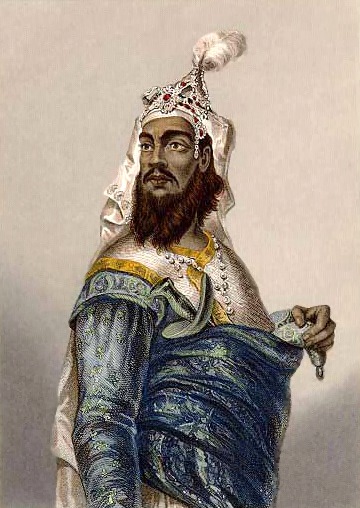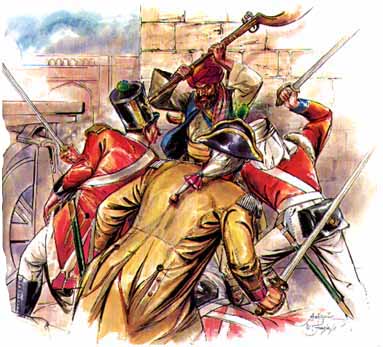<Back to Index>
- Military Leader Veer Kunwar Singh, 1777
- Freedom Fighter Rai Ahmed Khan Kharal, 1800+
PAGE SPONSOR

Veer Kunwar Singh (1777 – 1858), one of the leaders of the Indian rising of 1857 belonged to a royal Kshatriya (Rajput) house of Jagdispur, currently a part of Bhojpur district, Bihar state, India. At the age of 80 years, during India’s First War of Independence (1857), he actively led a select band of armed soldiers against the troops under the command of the East India Company, and also recorded victories in many battles.
Kunwar Singh, king of Jagdispur, was born in 1777, Jagdispur, near Arrah in the state of Bihar. He belongs to Panwar / Parmar (Ujjain Rajputs as they are locally known in Bihar or in and around his birth place). His ancestors belong to the dynasty of the great Raja Vikramaditya as well as Raja Bhoj of Malwa.
Babu Kunwar Singh was nearly eighty and in failing health when he was called upon to take up arms. The great warrior that he was, he gave a good fight and harried British forces for nearly a year and remained invincible till the end. Kunwar Singh assumed command of the soldiers who had revolted at Danapur on July 5. Two days later he occupied Arrah, the district headquarters. Major Vincent Eyre relieved the town on 3 August, defeated Kunwar Singh's force and destroyed Jagdispur. Kunwar Singh left his ancestral village and reached Lucknow in December 1857. In March 1858 he occupied Azamgarh. However, he had to leave the place soon. Pursued by Brigadier Douglas, he retreated towards his home in Bihar. On 23 April, Kunwar Singh had a victory near Jagdispur over the force led by Captain Le Grand. On 26 April 1858 he died in his village. The mantle of the old chief now fell on his brother Amar Singh who, despite heavy odds, continued the struggle and for a considerable time, running a parallel government in the district of Shahabad. In October 1859, Amar Singh joined the rebel leaders in the Nepal Terai.
In his last battle, fought on 23 April 1858, near Jagdispur, the troops under the control of the East India Company were completely routed. While crossing the Ganges on way to his ancestral seat at Jagadispur, Veer Kunwar Singh was wounded in the arm. Undaunted, veer Kunwar Singh severed the injured limb and flung it into the river Ganges as is was his last offering to the Ganges. Soon after, he completely routed the British forces in the battle on 23 April 1858 and died the next day (24 April 1858). He was respected as a good and brave warrior.
To honor his memory and his contribution to India’s freedom movement, the Republic of India issued a commemorative stamp on 23 April 1966. Veer Kunwar Singh University named after him, was established by Government of Bihar near his Jagdispur birth place.
The ICSE board has in its hindi textbook
(Ekanki Suman) a play (by the name of Vijay Ki Vela, literally: Moment
of Victory) on the later part of Veer Kunwar Singh's life, starting from
the time he was crossing the river Ganges and finishing with his death,
because of his injury.

Rai Ahmed Khan Kharal was one of the greatest freedom fighters in the Indian rebellion of 1857.
He was a resident of Neeli Bar's famous town Gogera, District Sahiwal. He started his rebellion in a wide area of Punjab, Pakistan, covering Ganji Bar, Neeli Bar and Sandal Bar area (an area between rivers Sutlej, Ravi River and Chenab, covered with thick forests in the past). A Punjabi Muslim, Rai Ahmed Khan Kharal was basically a landlord, owner of a reasonably worthy territory, he was leader of Kharal Tribe due to the prevailing injustice at that time, love for his mother land resulting to differences with the rulers, he was a peace loving, landlord, with respectable status but due to the prevalent injustices was made the leader of the freedom fighters who carried out the famous Gogera insurrection. They also attacked the Gogera Central Jail and ensured the freedom of hundreds of freedom fighters who were kept there for actively taking part in the War of Independence 1857. These freedom fighters under the command of Rai Ahmed Khan Kharal were able to make a vast part of their land totally free of the British Raj for at least three months. Their headquarters was at Kot Kamalia. Along with his companions Murad Fatiana, Shujaa Bhadroo, and Mokha Wehniwal, he killed Lord Burkley, the Commissioner for Gogera. He united most of the Bari tribes against the British rule and was finally killed in a battle with British forces defending his beloved motherland. After his death his head was taken along by the British soldiers, but snatched back by one of his loyal friends. His efforts for the freedom of the homeland from British rule were also acknowledged by the last Moghul king, Bahadur Shah Zafar.